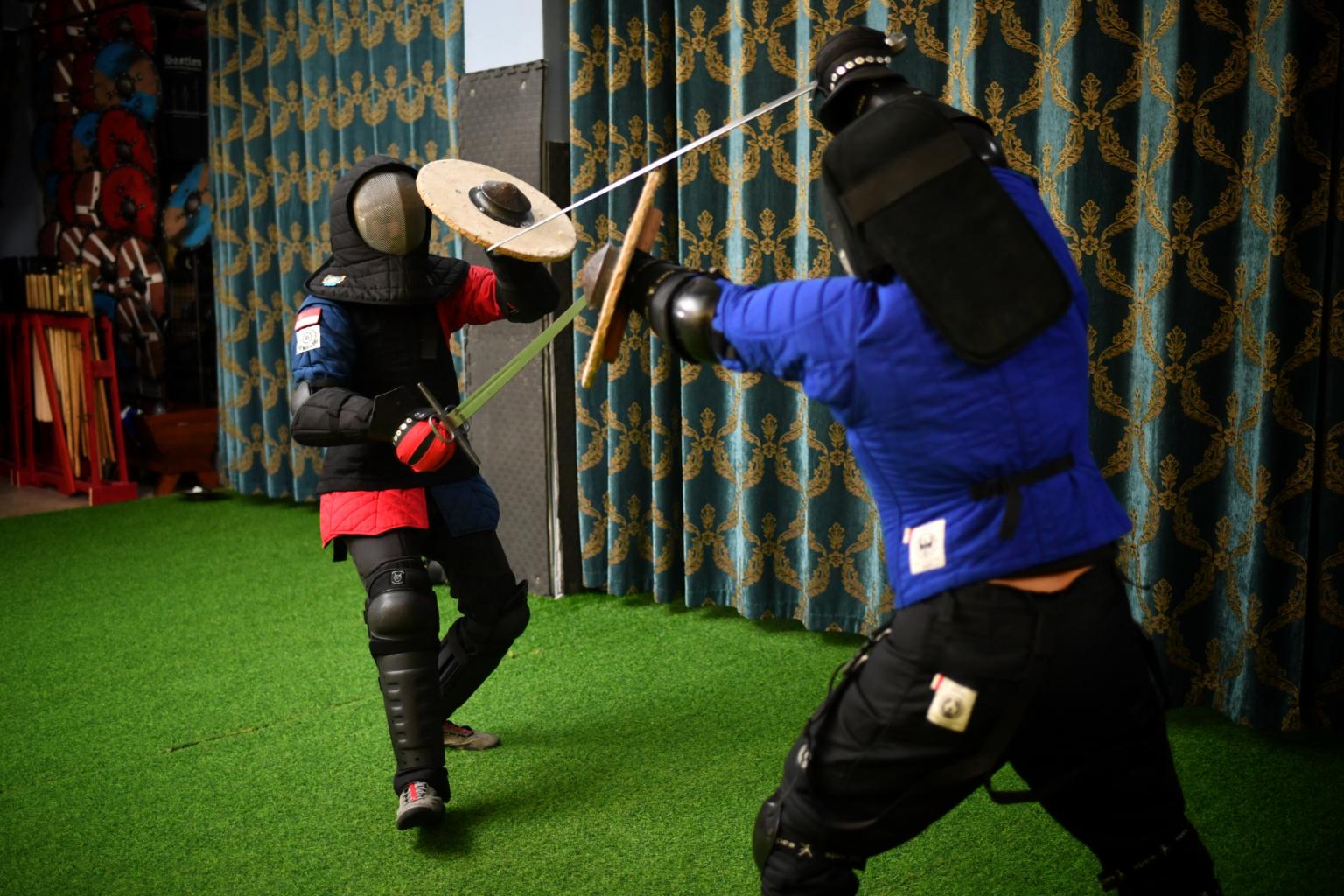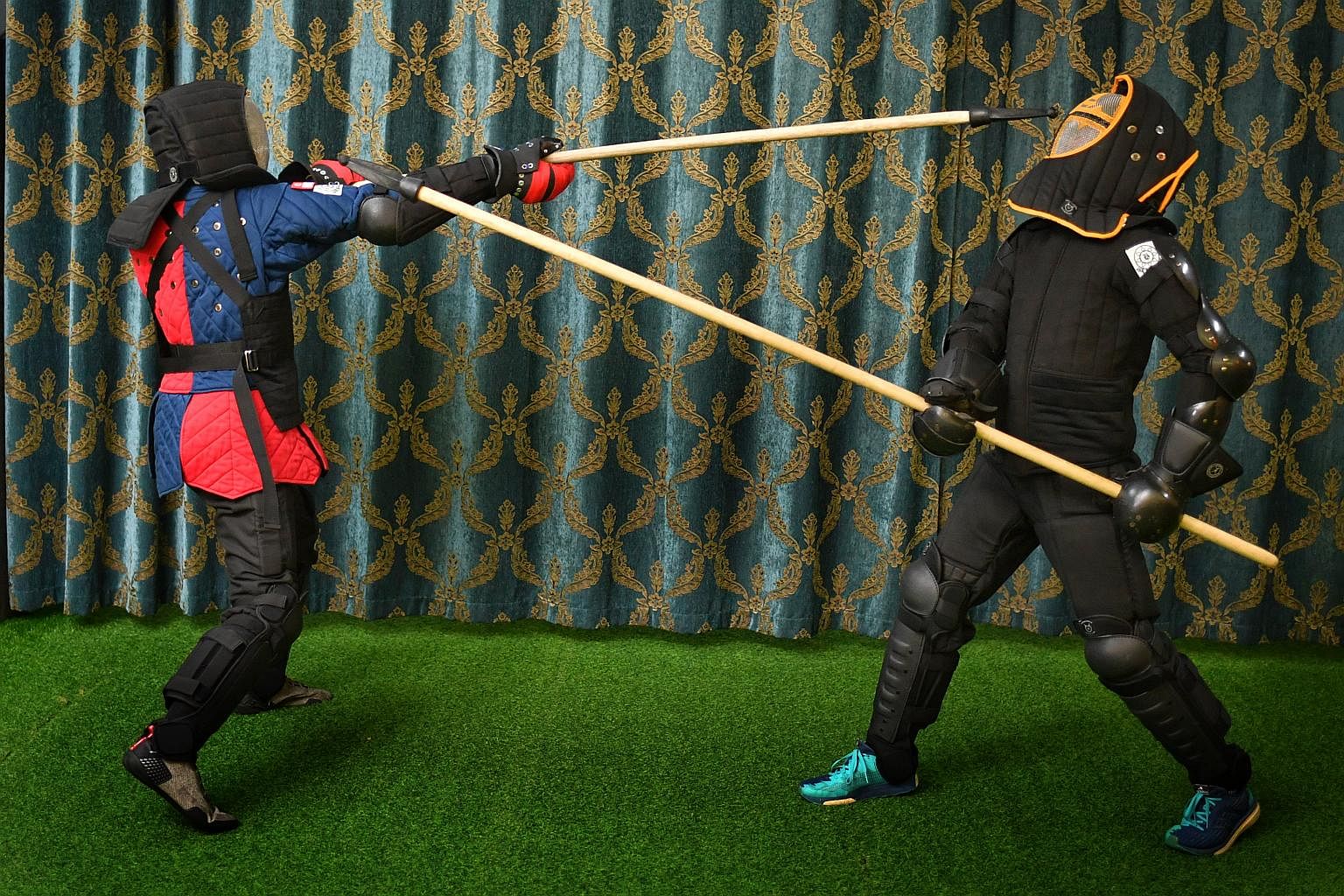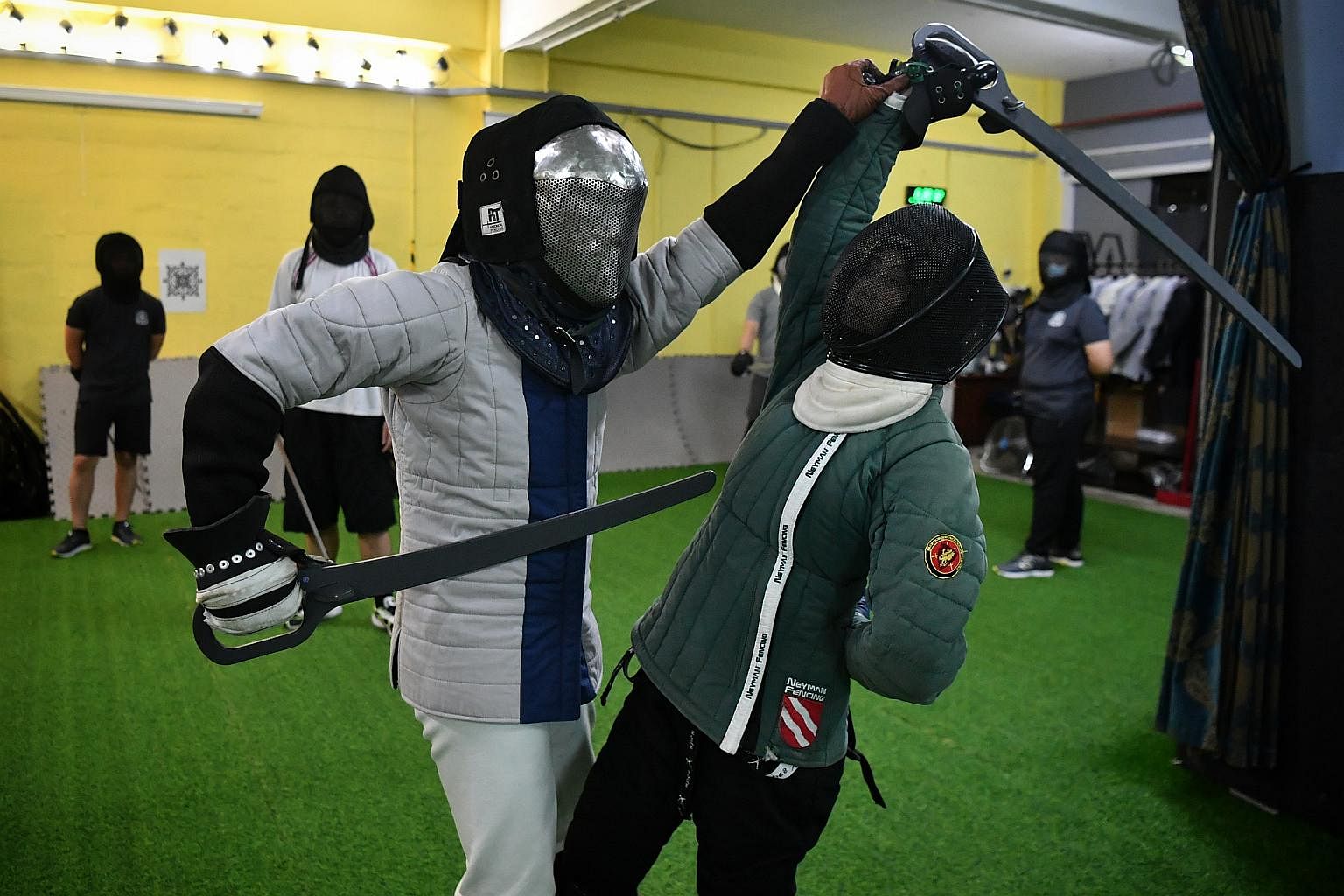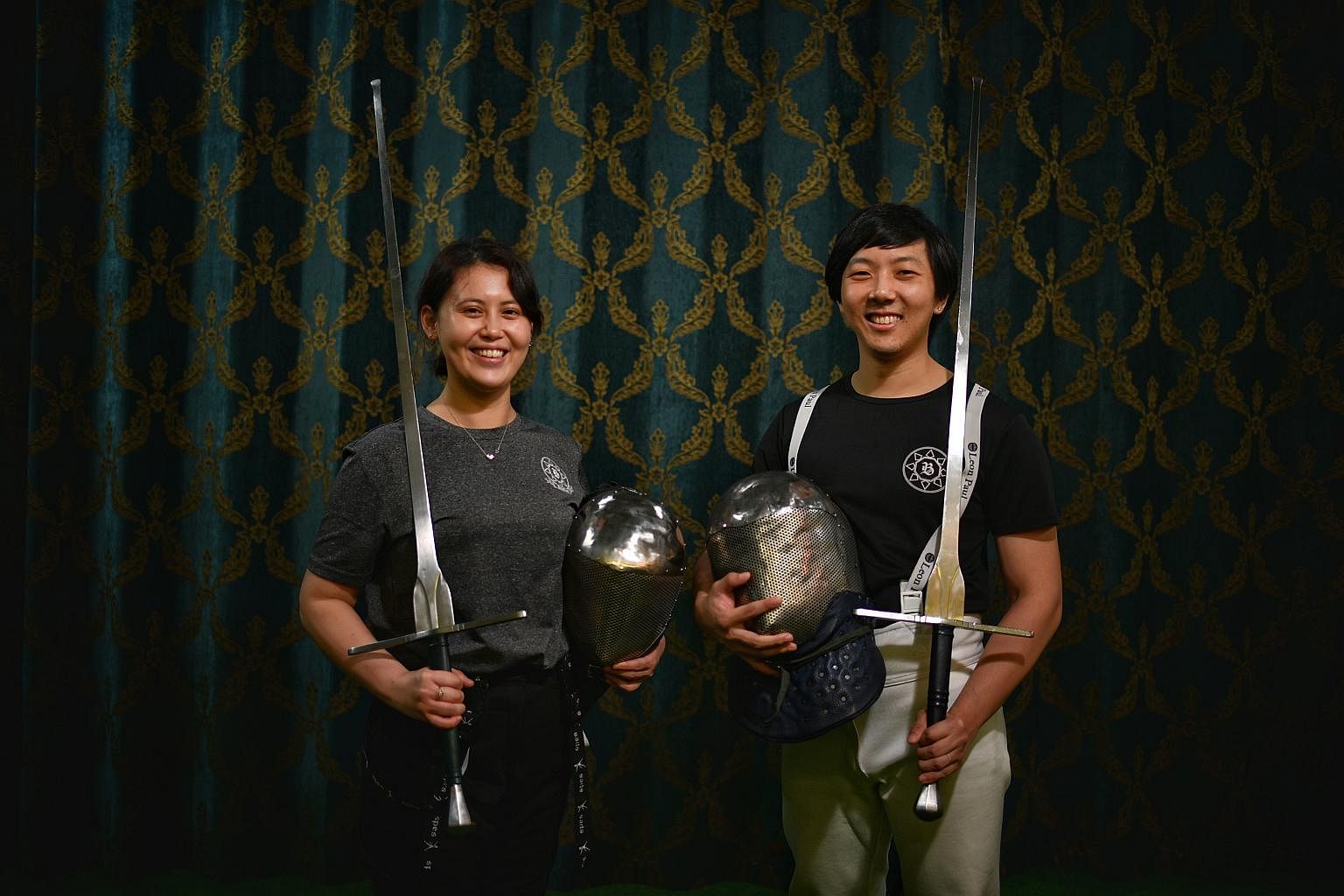For The Love Of The Game: Fancy a sword fight a la Lord Of The Rings? Here's where you can go
Sign up now: Get the biggest sports news in your inbox

Participants sparring during an Historical European Martial Arts session.
ST PHOTO: CHONG JUN LIANG
SINGAPORE - Tucked away on the fifth floor of a nondescript industrial building along Jalan Pemimpin is an armoury of mediaeval weapons.
The vast collection of longswords, rapiers, spears and shields belong to Bastion, a Historical European Martial Arts (Hema) academy, where enthusiasts of the little-known sport clash swords in sparring sessions up to six times a week.
Hema, Bastion founder Lucien Lee explained, is "the revival of mediaeval martial arts" and involves the study and practice of fighting systems in Europe dating back to the 13th century.
The weapons used for training, he added, are either made of wood, nylon, foam or steel, with the latter featuring blunted blades and folded or flattened tips. Participants also have to be suited up in protective equipment, namely padded jackets and face masks.
Lee, 31, started Bastion with his wife Langley Qu in 2017. They had both picked up the sport while studying in Swansea, Wales, in 2013.
When they returned to Singapore three years later, they wanted to continue practising the sport and went online in a search for like-minded enthusiasts. What started as a Reddit post then grew into an academy where over 200 students have passed through. Bastion currently has about 70 students, said Lee.
Qu, who is American, said: "We have some students from our very first batch still with us, and even one guy from the trial group that started from that Reddit post.
"Whether it's an interest in martial arts, or whether you like fencing and want to try fencing's great grandfather, or whether you love gaming and want to come here and do the real thing… Whatever it is that brings you here, there's something for you to do."
Indeed, Hema practitioners have various reasons for picking up the sport. Some are intrigued by its uniqueness, while others want a novel physical activity to keep fit. There are also those attracted by the lore of mediaeval culture in pop culture through TV shows or movies like Lord Of The Rings or Game Of Thrones, or even games such as Dungeons And Dragons.
Lee said that working adults under the age of 40 make up the largest group of Bastion's students, while a sizeable number also comprise students who are in their late teens and early 20s, or those serving National Service. There are also over 40s.
"There's always new blood coming in," said Qu. "But I would say the older ones tend to be very dedicated."
Because of the nature of the activity, Bastion requires new students to undergo a 12-week basic programme before progressing further.
The Pan-Historical European Martial Arts Society (Phemas), which also teaches Hema in Singapore, also carries out a similar programme to introduce the sport to newcomers.
Its president, Rigel Ng, said that while there is a minimum age of 18 to join Phemas, younger members are also able to join with the approval of a parent or guardian, and their admission is on a case-by-case basis. The society, which was founded in 2005, has had members as young as 10 and as old as 50, added Ng, although the ages of their current membership of about 40 range from early 20s to 40s.
While the 26-year-old believes the popularity of Hema in Singapore has "increased exponentially within the last five years", there is still a long way to go before it is commonly known in the mainstream. Lee added that Hema is still a "very, very niche" activity locally.
Ng noted that while Hema has become "almost synonymous" with historical fencing or swordsmanship, in its broader scope it also encompasses European archery, mounted combat, and other weapon systems like axes and even scythes.
But Hema is not all about swinging swords and other mediaeval weapons at one another, said Qu. "A good chunk of it is also the scholarly arts," she said.

Weapons used for training in Hema are either made of wood, nylon, foam or steel, with the latter featuring blunted blades and folded or flattened tips. Participants also have to be suited up in protective equipment.
ST PHOTO: CHONG JUN LIANG
Flitting through the pages of a book that features drawings and scribbles in mediaeval Italian - and then another almost carbon-copy book, except with the text translated into contemporary English - Lee explained: "The revival of the Hema has to come from somewhere. We don't make things up.
"These kinds of techniques or fighting systems need to be researched on and they come from treatises, fighting manuals and manuscripts that are left by the mediaeval masters.
"Without this (referring to written history), all you're doing is sword fighting, and not really Hema."

Mr Lucien Lee and Ms Langley Qu (in green top) demonstrating fighting techniques during a Hema class.
ST PHOTO: CHONG JUN LIANG
Lee, however, added that poring through Hema academic texts are usually only reserved for those with an interest in becoming instructors, and said that there is hardly any barrier to entry for those interested in participating in the sport.
Lee and Qu point to themselves as examples, having had different levels of physical activity before first laying hands on a longsword in Wales all those years ago.

Ms Langley Qu and Mr Lucien Lee, founders and senior instructors at Bastion HEMA.
ST PHOTO: CHONG JUN LIANG
Lee had dabbled in other martial arts such as krav maga and judo, while Qu said the most strenuous physical activity she had done was yoga.
"But I quickly enjoyed the empowering aspect of it… that's what kind of got me right from the get-go," she said.
What you need to know about Historical European Martial Arts
Who: Bastion HEMA or PHEMAS.
Where: Bastion HEMA is located at Jalan Pemimpin while PHEMAS conducts its classes at the Eurasian Community House along Ceylon Road.
When:
Bastion HEMA: Mondays to Thursdays, after 5.30pm and Saturday and Sunday, from 2-8pm
PHEMAS: Paid classes are conducted every Wednesday (except for the second week of the month where it is held on Thursdays) from 7.30-9.30pm and Saturday from 12-2pm.
Free training is provided on Saturday from 10am-12pm
Cost:
Bastion HEMA: Two types of membership packages. The Squire package ($145) entitles members to up to six two-hour sessions a month, while the Knight package ($240) entitles members up to 12 sessions a month. Bastion provides equipment for every student.
PHEMAS: $40 dollars a month, which is inclusive of loaning of protective equipment and weapons.
For those keen to purchase their own equipment, Bastion and PHEMAS do bulk orders for their respective clubs from time to time to reduce cost on shipping and handling.
Activities:
Both Bastion HEMA and PHEMAS offer basic courses where students will learn fundamentals of longsword fencing.
After that, at Bastion HEMA, students go on weapon-focused programmes, concentrating on a specific system such as messer or spear over a 12-week term.
At PHEMAS, a student who completes the basic course is free to continue to advance longsword fencing or take on a new weapon system in a basic form.
The society also dedicates Saturday mornings to free training and sparring, although students must have completed most of their course to start doing so.


